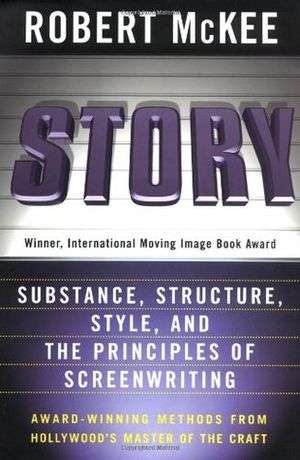Story: Substance, Structure, Style and The Principles of Screenwriting

"Who are the characters? What do they want? Why do they want it? How do they go about getting it? Who stops them? What are the consequences?"
Story: Substance, Structure, Style and The Principles of Screenwriting is a 1999 book by Robert McKee about the elements at work in stories. Primarily concerned with film and television (McKee was a story analyst for United Artists and NBC back in the 80's), the text claims to be applicable to all storytelling mediums, such as stage plays and novels.
Story borrows heavily from older texts, most specifically Aristotle's Poetics; McKee not only notes this, but often suggests the older work is essential if a true understanding of narrative techniques is desired. Many of the tropes found on This Very Wiki are detailed at great length; notable emphasis is placed on Act Structure,[1] Genre Conventions, Conflict, and the relationship between Character and Plot.
The book is itself an adaptation of McKee's STORY seminar, a (sometimes) two-day event where he educates, curses at, illuminates, and brings to tears many of the aspiring screenwriters in attendance.
Passages from McKee's book are quoted and a reenactment of the seminar is presented in the Charlie Kaufman-penned Adaptation. McKee himself served as a consultant on the film.
- An Aesop: The Controlling Idea is the story's main lesson, illustrated through how the different scenes play it straight, why it doesn't, why both sides are wrong, and who exactly is worse than all of the sides combined.
- Anvilicious: Discussed and advised against...
The writer, for example, may decide that war is the scourge of humanity, and pacifism is the cure. In his zeal to convince us all his good people are very, very good people, and all his bad people are very, very bad people. All the dialogue is "on the nose" laments about the futility and insanity of war, heartfelt declarations that the cause of war is "establishment." From outline to first draft, he fills the screen with stomach-turning images, making certain that each and every scene says loud and clear: "War is a scourge, but it can be cured by pacifism... war is a scourge cured by pacifism... War is a scourge cured by pacifism..." until you want to pick up a gun.
- Beyond the Impossible: Advised against to keep the consistency of the setting unless the point of the work is to break the setting convention or story conventions.
- Bittersweet Ending: Defined as an Ironic Ending, where two value charges (thematic statements) end on opposite charges; one being positive and one being negative, but not entirely cancelling eachother out.
- BLAM Movie: Acceptable under Antiplot structure if the point of the work is to say that life does not make sense.
- Captain Obvious: Any form of "on the nose" writing (writing subtext onto the text itself or pointing out the obvious) is strongly advised against.
- Centipede's Dilemma: Discussed in the epilogue about how writers who understand the principals of story should not worry about how they write, but continue doing what they've been doing with greater skill and insight.
- Cliché: The result of a writer's lack of research, calling upon how similar events happened in other stories.
- The Climax: According to Story, this is where the Controlling Idea is most expressed.
- Did Not Do the Research: Some of the scene examples for Star Wars and Kramer vs. Kramer don't entirely match up to how they happen, but after reading the book, it turns out they follow McKee's theories more than his own examples.
- Flat Character: Encouraged for bit parts and one-off characters. Endowing one-off characters with too many traits makes audiences wonder what happened to that character.
- Narrator: Despite what Charlie Kaufman said in Adaptation, narration is fine if it adds to or countpoints what is happening on-screen. Otherwise, narrating what is obviously happening adds nothing.
- Random Events Plot: Acceptable under the Antiplot structure.
- Static Character: Acceptable as the main character is they have deeper traits than they initially seem to have.
- Stylistic Suck: The synopses for the "personal story" and "guaranteed commercial success" bad scripts.
- ↑ that is not limited to the three act variety